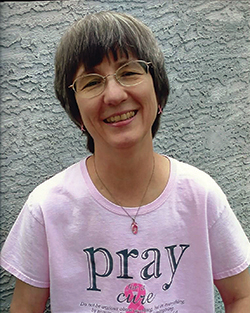Breast Cancer Survivor
Giving Back After Breast Cancer
 Teresa Hill was diagnosed with Stage IIB breast cancer (invasive ductal carcinoma) at age 41 in July 2005. After a double mastectomy and chemotherapy, she is cancer-free. Now she leads a faith-based support cancer group so no one has to go through cancer treatment alone.
Teresa Hill was diagnosed with Stage IIB breast cancer (invasive ductal carcinoma) at age 41 in July 2005. After a double mastectomy and chemotherapy, she is cancer-free. Now she leads a faith-based support cancer group so no one has to go through cancer treatment alone.
I found the lump while in the shower, just 18 months after my first mammogram came back all clear. It was there during that first mammogram, but because I have dense breast tissue, they didn’t see it. I brought the area to my gynecologist’s attention, and she ordered a new mammogram and an ultrasound.
After the ultrasound and a biopsy, my gynecologist called to tell me it was Stage IIB invasive ductal carcinoma. I was shocked, overwhelmed and scared. My first thought was that I wouldn’t see my two sons, who were 9 and 11, finish school.
My gynecologist referred me to a breast surgeon. The process started to feel like a roller coaster going faster and faster, and I just wanted to get off. At my appointment with the surgeon, I learned the first treatment decision I had to make was lumpectomy or mastectomy. Once the breast MRI showed two satellite lesions, I went with a double mastectomy. I’m so thankful I did because my other breast proved to have precancerous cells. Then I had to decide whether I wanted reconstruction.
My breast surgeon wouldn’t operate until I met with a reconstructive surgeon. I listened to everything the reconstructive surgeon said and decided not to have reconstruction. Sometimes implants last a long time, and sometimes they don’t. I was only 41 and didn’t want to have to deal with them again in 10 years. I am still happy with the decision I made.
The hardest part of my diagnosis was telling my boys. They were both in elementary school, and I had been really active with their school. All of a sudden, they didn’t have that anymore. They were scared they wouldn’t have a mom. I found some helpful resources for talking to kids about cancer that made me feel more comfortable explaining it to them. Enough people have to explain cancer to their children that these resources were necessary, which reassured me. I wasn’t alone, and neither were my kids.
After surgery, I had chemotherapy every two weeks for four months. My oncologist gave me two different options of chemotherapy and three different ways to administer it. I decided to hit it hard and chose the most aggressive treatment option he suggested. After those four months, I took hormone therapy for five years. It’s a pill, so I was able to take it at home every day.
Chemotherapy took a great toll on me, physically and emotionally. I had terrible nausea and was hospitalized for dehydration on my son’s birthday. When I first started down this path, I didn’t know what questions to ask. Eventually I started working with an oncology nutritionist and learned what foods to avoid with my nausea. For me, greasy foods were especially hard and set off my acid reflux. I also had joint pain but pushed through it.
I am now cancer-free. When I was first diagnosed, I feared I wouldn’t see my little boys finish school. Now I’ve seen both graduate high school and one get married.
What got me through my diagnosis and treatment was my community and the support from my family, friends and church. Even now, that support keeps me strong. I didn’t know how many cared and am so blessed and humbled by it. So many people offered to help. One of the best things a person with cancer can do is make a list of all those friends calling. Even if you don’t need their help yet, write down their names and offers. It will be handy later.
Aside from friends and family, other people helped me answer questions I didn’t even know to ask. Getting a case manager from my insurance company was a big help. Sadly, dealing with insurance can be difficult, but my case manager helped me get through all the approvals and other steps. She even called to ask how my appointments went and how I was feeling.
People in support groups can be another tremendous resource because they’ve walked the walk. My support group helped me figure out how to respond when friends avoided me because they didn’t know what to say or when a well-intentioned comment just didn’t land right. I got a lot of advice about managing my emotions and outlook, as well as practical tips about day-to-day life with cancer. The experience was so important to me that I started leading a faith-based support group through my church. It’s let me grow, become stronger and give back. My goal is to let the community know they’re never alone.
Before my cancer diagnosis, I didn’t speak up for myself and didn’t want to cause trouble. Now I’ve become more assertive. When I was first diagnosed, I thought of cancer as the big “C” in my life. I learned that, for me, the big “C” wasn’t cancer but Christ. My faith turned cancer into just a little “c” and stomped it out. Don’t be afraid to accept help or even ask for it. When someone offers to help, they’re doing it because they want to. Don’t block their blessing. Helping you helps them, and we ourselves give back by letting them help us in some way.


